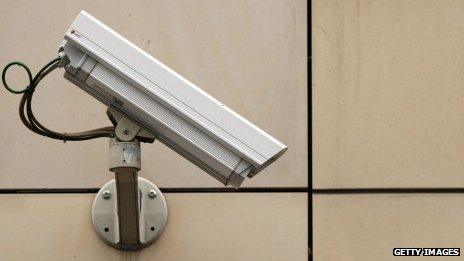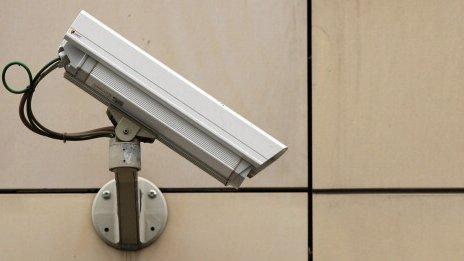Call to probe UK firm over Bahraini 'spying' claims
- Published

Gamma Group describes itself as a "manufacturer of surveillance and monitoring systems"
The National Crime Agency has been asked to investigate a British company for allegedly aiding the surveillance of Bahraini activists living in the UK.
In a complaint sent to the NCA by Privacy International on Monday, Gamma Group is accused of supplying software and providing support to Bahrain.
Privacy International held a press conference, where Gamma Group was not represented, to announce the action.
Gamma Group has not responded to requests for comment.
The company stands accused of aiding surveillance of three men, who all live in the UK, by supplying a piece of spying software called FinFisher to the government of Bahrain.
The activists - Moosa Abd-Ali Ali, Jaafar Al Hasabi and Saeed Al-Shehabi - appeared at the press conference in London.
The first two claimed they had been detained and beaten in the past in Bahrain but now resided here.
The third Saeed Al-Shehabi, who has lived in London for decades, said he had been concerned about surveillance and limited his contact with others in Bahrain.
"I am shocked and also a little perplexed," he said of the accusations against Gamma Group.
'Shut down their dissent'
Rights group Privacy International argues that the actions of Bahrain amount to an offence of unlawfully intercepting communications under the Regulation of Investigatory Powers Act (2000) and claims that Gamma Group - by allegedly assisting Bahrain - was liable of aiding and abetting them in that crime.
Lawyers working with the men and Privacy International said they were not aware of any precedent for such a case.
In support of its argument, Privacy International points to what are said to be internal Gamma Group logs leaked over the summer.

Privacy International says the FinFisher software was used for unlawful spying
The campaigning group claims these show that the company was providing support to the government of Bahrain in how to use the software and trouble-shooting problems they encountered while spying on the activists.
The logs are alleged to show details of the surveillance operations, including the names of the activists and specific computers being targeted.
They reveal those using the system occasionally struggling to get the tools to work and requesting advice and support.
The surveillance software was said to have been delivered either in the form of an attachment to an email or as a fake update for Apple's iTunes software.
Privacy International claim this then enabled Bahraini authorities to have "extraordinary access" to the men's computers including the ability to read documents and emails, turn on web cameras and microphones and impersonate the men to send emails in their name.
'Evidence protection'
Privacy International said that it believed the software had the capability to self-delete and erase all records, making the logs vital evidence.
It also said it had sealed off the computers belonging to the activists to preserve the integrity as far as possible should the NCA decide to investigate.

The software granted "extraordinary" access to the men, it is alleged
On its website, Gamma Group describes itself as "an international manufacturer of surveillance and monitoring systems".
"We provide advanced technical surveillance, monitoring solutions and advanced government training as well as international consultancy to national and state intelligence departments and law enforcement agencies," it says.
The company did not respond to requests for comment.
The Embassy of Bahrain could also not be reached for comment.
An NCA official said its National Cyber Crime Unit "focuses on tackling the most significant and organised cyber-threats facing the UK, with responsibility for leading or supporting coordinated investigations into cybercrime".
- Published1 May 2013

- Published20 September 2011
